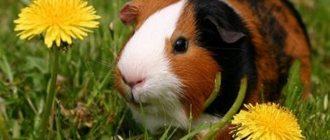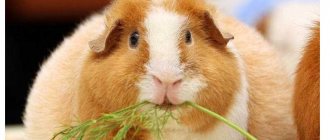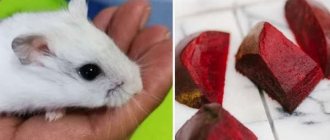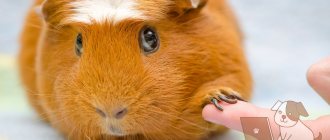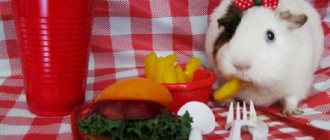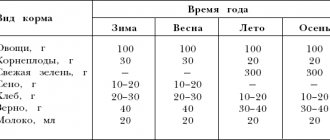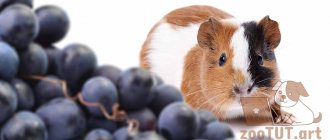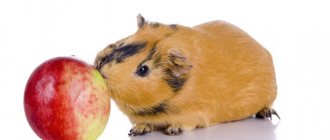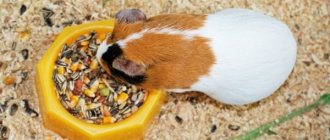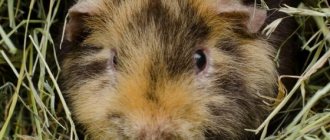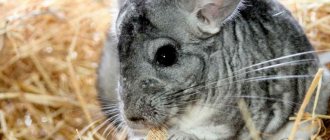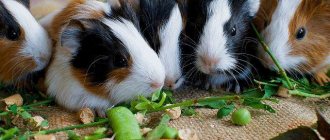Effect on the body of animals during feeding
Cows
Cows eat fodder beets with great pleasure.
When it is introduced into an animal’s diet, milk yield increases significantly. The amount of root vegetables consumed should not exceed 18 kilograms per day. This norm is calculated for an adult animal.
15 days before calving, you need to stop feeding fodder beets.
Goats
Root vegetables contain a substance that normalizes fat metabolism and also improves digestion.
Just like for cows, eating fodder beets by goats helps increase milk production and fat content. For an adult goat weighing 55–70 kilograms, it is enough to feed 3–4 kilograms of vegetables per day.
Chickens
At any time of the year, and especially in winter, birds need to consume plant feed. Eating the fruits and tops of a healthy plant helps compensate for the lack of vitamins in the chicken’s body. As a result, the eggs will have a hard shell and the yolk will have a bright summer yellow color, which indicates the health of the bird.
The amount of beets should be calculated in such a way that there are no more than 30-40 per adult.
Rabbits
Rabbits very actively consume both the beet fruits themselves and its tops. This is a very healthy vegetable, as rabbits need fiber for normal digestion. Eating fodder beets will make the animals' fur look healthy, and the taste of the meat will also improve.
An adult rabbit can consume up to 300 grams of fodder beet without harm to its body.
Important. Beets should be introduced gradually into the diet of animals
To begin with, it is better to feed the rabbits boiled vegetables.
Pigs
The plant is a favorite treat for pigs. They can consume it both raw and boiled.
The result of feeding beets will be very good. Due to the fact that the root vegetable normalizes digestion, the animal’s weight gain will increase. Another useful property of beets is the improvement of fat metabolism, so when an animal eats the vegetable, it can reduce the fat content of meat.
The amount of root vegetables in the diet can reach up to 30 percent of the total food consumed per day.
Fodder beet is an indispensable ingredient in the diet of animals. It has beneficial properties that help them grow healthy and improves the quality of their products.
Carrot
Carrots are a very healthy vegetable containing pectin, carotene, vitamins C, E, K, group B, and microelements. The substances contained in carrots have a beneficial effect on metabolic processes in the pig’s body, thereby improving the pet’s vision, hearing, and condition of the skin and coat. You can also feed carrot tops, which are also useful. Eating this vegetable may cause your pet's urine to turn orange.
Bread
It is indispensable in our daily life. It comes in different types, black and white, with and without yeast, dry and stale, with and without additives. Recently, it has even been baked from artificial wheat. All this is of great importance.
Fresh bread is strictly contraindicated for guinea pigs. It should not be given, as it is poorly digested and remains to ferment in the stomach. White bread also often leads to bloating and worsens overall health.
In principle, if you feed your pig bread quite rarely and in small portions, then it is possible. But, if you do not need your pet to suffer from digestive problems and constipation, then it is better to abandon this idea.
Jerusalem artichoke
The entire Jerusalem artichoke plant, leaves, flowers, roots, is edible for guinea pigs. Jerusalem artichoke contains a large amount of fiber and essential amino acids - lysine, leicine, arginine. Root vegetables contain inulin, a natural analogue of insulin, which is why Jerusalem artichoke is recommended for those prone to diabetes. But root vegetables should not be given to marine animals often, since they are considered concentrated feed, and young tubers contain poorly digestible starch, which can cause intestinal disorders.
What to feed your guinea pig?
Guinea pigs are highly sensitive pets that require careful care, love and attention from their owner. In a starving rodent, after a day, the intestines stop working, and the animal dies.
Guinea pigs are highly sensitive pets that require careful care, love and attention from their owner. The digestive tract of rodents of this species is designed in such a way that for normal functioning and preservation of health, animals must receive the same food at home as they would receive in their natural habitat. The owner must clearly know what to feed the guinea pig
Adequate nutrition for an animal is a matter of vital importance. In a starving rodent, after a day, intestinal function stops and the animal dies
How to replace radishes
Despite the obvious limitations in feeding radishes to a guinea pig, similar products can be found. In general, pet stores offer a wide range of ready-made dry food for rodents, but many owners prefer to feed their pets themselves. Therefore, you should immediately find out which products are suitable for feeding the animal:
- Spinach;
- Cucumbers;
- Tomatoes (in limited quantities);
- Sweet bell pepper;
- Carrots (can be given on a daily basis);
- Parsley leaves;
- In summer, you can offer your pet thoroughly washed dandelion leaves;
- Fruits and cereals.
Despite the obvious simplicity of feeding, each product has its own dosages and recommendations; you can familiarize yourself with them, but it would be better to use a ready-made mixture purchased at a pet store.
Turnips or radishes can be used as a substitute for radishes; they have a similar taste and aroma, but cannot harm the fragile body.
Watermelon
Guinea pigs can be given a little watermelon during the summer season. Try to give ripe pulp, and it is advisable not to give the white part closer to the rind, since it is in this part that nitrates accumulate. For the same reason, pigs should not be given early vegetables. Watermelon is a diuretic, so indulge your pet with it infrequently.
Article on the topic: Can guinea pigs eat tomatoes and cucumbers? Do they eat them?
The same goes for melon. This vegetable is given from your own garden or purchased in season. It is also not recommended to give melon frequently; it is very sweet and can contribute to the development of diabetes.
We tried to consider in as much detail as possible and give answers to the question “What vegetables can guinea pigs eat?” As you can see, most vegetables are not only possible, but also should be given to guinea pigs. The most important thing is a properly formulated and balanced diet for your pet, including products grown without chemicals. To keep your guinea pig healthy and cheerful, stick to proper nutrition and your pet will thank you with its playful behavior and healthy appearance.
So, we have dealt with the question of what vegetables can guinea pigs eat, but we described in this article whether your pet can eat grass. You may be interested in this information.
Vegetables
Can guinea pigs have radishes?
It is permissible to use only radish tops. The root vegetable contains essential oils that can cause irritation to the mucous membranes and respiratory tract of the animal. The vegetable also causes bloating. Therefore, it is not recommended to give radishes to pigs.
Can guinea pigs eat celery?
Celery can be given in any form - stems, leaves, roots. This vegetable is included in many dry food for rodents. Celery is enriched with vitamins B, PP, E, C, A and contains phosphorus, zinc, potassium, calcium, iron and magnesium. Before eating, celery must be washed thoroughly, especially the root.
Can guinea pigs eat tomatoes?
Ripe fruits can be included in the food. Tomatoes are well absorbed by animals and contain vitamin C and carotene, which are beneficial for their body. Green tomatoes contain solanine, which can negatively affect your pet’s health.
Too many tomatoes in an animal's menu can cause loose stools.
Can guinea pigs eat cabbage?
Cabbage can be included in the animal's diet. Cabbage contains many vitamins and other substances necessary for pigs:
- ascorbic acid;
- B vitamins;
- vitamins of the PP group;
- folic acid;
- sulfur;
- calcium;
- potassium;
- phosphorus;
- amino acids;
- microelements.
The vegetable is able to keep the animal’s fur in excellent condition and strengthen its immunity. The top dried leaves should be given. It is preferable to feed guinea pigs Chinese cabbage and broccoli. White cabbage can cause bloating.
Can guinea pigs eat potatoes?
Green and sprouted potatoes are contraindicated for guinea pigs. Raw vegetables can be given occasionally, cut into small pieces. Boiled potatoes can be offered to your pet separately or added to grains and other foods.
The vegetable contains solanine, which can harm the health of the animal if the pet eats too many potatoes. The pig will become passive and catch cold quickly.
Can guinea pigs eat beets?
Beetroot contains many substances useful for animals: vitamins C, A and B, potassium, magnesium, phosphorus, iron. In excess, the vegetable contains fiber, so it acts on the animal’s body as a laxative. Store-bought root vegetables may contain nitrates, which are very harmful to the small body of guinea pigs. It is better to offer your pet homemade crops. The composition also contains a large amount of oxalic acid, so it is better to limit the consumption of this product.
It is recommended to give beets starting from 2 months; they are especially useful in winter and spring, when there are no fresh vegetables. The daily dose should not exceed 200 g, and it is better to exclude beets from the diet of pregnant and lactating pigs so as not to provoke an upset stomach. Beets turn stool and urine red, so if your animal has eaten them, don’t be alarmed by such changes.
Can guinea pigs eat pumpkin?
Pigs can be given all varieties of pumpkin that humans eat. For the digestion of herbivorous animals, such a product will be familiar and useful. Pumpkin contains vitamin C, calcium and phosphorus necessary for rodents. It should be borne in mind that this low-calorie vegetable will not be able to saturate the pig completely, so it is better to give pumpkin to guinea pigs as a treat.
Can guinea pigs eat bell pepper?
Another storehouse of ascorbic acid is bell pepper. Before use, the vegetable must be thoroughly washed and chopped, and the seeds removed. It is better to give the product together with dry food.
Green peppers containing solanine should not be given to animals, as should peppers in the form of hot seasonings. Spicy foods will damage the mucous membranes.
Can guinea pigs eat cucumber?
Cucumbers don't have as many nutrients as other vegetables. You can offer your pet a cucumber. The vegetable can harm your pet's health by causing digestive problems only if consumed in large quantities.
Can guinea pigs eat zucchini?
Zucchini is suitable for the diet of guinea pigs. They contain small amounts of vitamin C, calcium and phosphorus. It is better to prefer young vegetables; they can be given along with the peel, cut into crowbars.
Cucumber
A ripe cucumber is a source of water, potassium and vitamin C. Your pet likes the taste of a juicy natural product. Fresh fruit will quench thirst and normalize the process of assimilation by the rodent’s body of useful substances supplied with other food products.
During the season, the guinea pigs are given cucumbers grown in their own garden. A purchased harvest from a greenhouse may contain nitrates, which even in small doses can cause severe poisoning in an animal, resulting in death.
You can give cucumber to guinea pigs only in moderate quantities: a single serving is equal to a quarter of a medium-sized fruit.
What food to give your guinea pig
Guinea pigs eat a variety of foods and greens. According to the recommendations of experienced specialists, the pet’s diet should be varied and balanced. ½ of the total menu should be hay. The remaining 50% of the diet is dry food, succulent food and greens.
Dry food
Dry food includes grain crops and factory-produced granulated mixtures (special food for domestic guinea pigs).
Healthy grain feeds:
- millet;
- barley;
- sunflower seed;
- oats;
- corn grains.
Ready-made mixtures may contain vitamin complexes.
Grains should be in the guinea pig's diet every day and should always be freely available to the pet.
Hay and branches
Hay is the most useful and necessary product for guinea pigs. It improves the functioning of the digestive tract and prevents the development of intestinal diseases, and also helps to grind down the back teeth.
What kind of hay to give your pet:
- fresh, with a natural grassy smell;
- free from dust and other contaminants;
- small bundles (can be pre-cut or rolled into a roll);
- without coarse and large branches.
This food also needs to be given to your guinea pig every day. You can make hay yourself or purchase it ready-made in a store.
Green food
Another important product in the diet of domestic guinea pigs is green food. This is meadow or field grass grown in ecologically clean areas (away from polluted road areas).
Green herbs contain many useful and nutritious substances necessary for the healthy functioning of the body of guinea pigs. In addition, these animals happily eat fresh herbs, as well as equally healthy greens - spinach, dill, parsley, celery, lettuce, etc.
Healthy green food for guinea pigs:
- plantain leaves, dandelion;
- clover;
- cilantro;
- carrot tops;
- yarrow;
- chamomile, etc.
Juicy food
Juicy food for guinea pigs includes fruits and vegetables, as well as some berries, served to the pet as a tasty treat.
What juicy foods can you give:
- beets (fodder, red);
- fresh cucumbers;
- cauliflower and Brussels sprouts;
- carrot;
- Bell pepper;
- tubers and leaves of earthen pear;
- apples;
- garden sow thistle;
- corn cobs;
- zucchini;
- tomatoes;
- grapes (seedless only);
- pumpkin;
- green peas.
As a delicious dessert, you can sometimes pamper your pets with raspberries, wild strawberries, currants, strawberries and tangerines, which are rich in vitamin C.
Treats and vitamins
The body of guinea pigs especially needs vitamin C, so foods rich in ascorbic acid must be present in the daily diet of rodents. Salts and calcium are also important for them. To saturate the body with useful minerals, it is recommended to use special mineral stones from the store.
Healthy treats for guinea pigs:
- dried fruits;
- fruit slices;
- wheat bran;
- fresh cherry branches;
- mint;
- pea pods;
- peeled flax, sesame, pumpkin, sunflower seeds.
Zucchini is a healthy vegetable
First, let's talk about the beneficial properties of zucchini and figure out what kind of vegetable it is. Nowadays, zucchini can be easily bought in a store at any time of the year, although, of course, in the summer - at the height of the season, it is most enriched with useful substances. In any case, zucchini is always rich in fiber, vitamins and minerals. The first one very gently and delicately normalizes the activity of the gastrointestinal tract, helps remove toxins from the body and prevents constipation.
Pectins in zucchini have a positive effect on liver function. It also contains a lot of liquid, which is good for digestion.
Vitamins and minerals contained in zucchini:
| Vitamin | Benefit |
| Vitamin C | Supports immunity |
| Vitamin B9 | Fights anemia |
| Vitamin PP | Supports proper organ function |
| Vitamin H | Good for the nervous system |
| Vitamin B3 | Supports proper organ function |
| Vitamin B6 | Important for the immune and nervous systems |
| Vitamin A | Helps improve vision |
| Vitamin B1 | Activates the work of all internal organs |
Minerals contained in zucchini and their beneficial properties:
| Mineral | Benefit |
| Iron | Important for good blood |
| Potassium | Necessary for normal functioning of skeletal muscles |
| Phosphorus | Strengthens bones and teeth |
| Magnesium | Supports heart rate |
| Sodium | Very important for the excretory and digestive systems of the body |
Zucchini in a guinea pig's diet
Now it is clear that zucchini is a vegetable that contains many elements necessary for the animal’s life, and therefore, when asked whether guinea pigs can have zucchini, we answer unequivocally in the affirmative.
This treat should be given to your pet no more than twice a week. Remember that zucchini contains a lot of sugars, so the portion of the vegetable for the pig should be moderate.
Can guinea pigs eat canned zucchini? Of course not. After all, canned vegetables contain a huge amount of salt and vinegar, as well as various hot seasonings, which is not safe for the animal.
You can give your guinea pig zucchini, alternating it with other healthy, juicy plant foods - pumpkin, carrots, cucumbers, tomatoes, beets. Diet variety is the key to a healthy pig.
Is it possible to give cooked zucchini to a guinea pig? You can, but not fried, but stewed with a little water. You can also add carrots and pumpkin to this stew.
Interesting information about beets
This is a unique vegetable that has a beneficial effect on the body of both humans and animals. Its beneficial properties are not lost with any method of preparation and even with long-term storage.
Beetroot came to us from Byzantium in the 10th century and began to be used in many dishes. Now more than 70 varieties have already been bred, which differ from each other in yield, early maturity and appearance.
What kind of vegetable is this?
Beetroot is a root vegetable that improves metabolism and helps remove toxins, waste and other unwanted compounds from the body.
Composition and beneficial properties of beets
Beetroot is an annual, biennial and even perennial herbaceous plant. It contains B vitamins, which help normalize metabolic processes and support the vital energy of the animal, as well as microelements with antioxidant properties, folic and ascorbic acids.
It is in the root itself that there is a lot of iron, potassium, magnesium and vitamin A in the form of beta-carotene, which restores the functionality of the digestive system and liver.
NUTRITION AND RATION.
9 messages
Guinea pig nutrition is a very important topic. We will try to put as much information into this topic as possible. Adult pigs require from 10 to 20 mg of vitamin C per day. The need for vitamin C may depend on seasonal fluctuations, under normal conditions, pigs kept in an apartment require from 10 to 15 mg, pregnant females about 20 mg. Products lose some of their vitamins during long-term storage in winter; vitamin C in them is reduced by an average of 1/3. Also, the availability of nutrients is influenced by many factors, for example, storage conditions, types of varieties (different types of carrots, different varieties of apples), seasonality, etc. If you are giving fresh foods, then you should not give additional vitamin C, as this can only cause harm. With an excess of vitamin C in the urine, acidity increases, and a predisposition to kidney disease and skin irritation develops. The calcium/phosphorus balance should be 1.5:1. In animals with kidney problems, too much calcium in the diet can lead to the formation of kidney and bladder stones.
Incompatible vegetables - this termite means that these vegetables can cause more harm than good
Bulbous plants such as leeks, onions, and garlic are toxic. Legumes (beans: lentils, peas, beans) can cause bloating; feeding only green sprouts in small quantities is allowed. Raw potatoes contain indigestible starch, green spots and green sprouts are poisonous (contain solanine). Radishes and radishes contain a lot of essential oils, which can lead to irritation of the mucous membranes and cause bloating. You can offer tops from these vegetables. You can use the radishes themselves, if they are not spicy. Rhubarb, due to its high oxalic acid content, is toxic.
What not to drink
The rules for watering a guinea pig are quite simple. The animal can drink exclusively fresh, clean, not cold water. The animal must have access to it at all times. You need to change it in the drinking bowl every day. No other drinks should be given to your pet. They can lead to digestive upset or even death.
So, in order for your pet to enjoy good health and longevity, it should be fed properly. The diet must be complete, that is, include all the vitamins and minerals necessary for the rodent. Before giving your pig any new product, you should find out whether it is prohibited for consumption by this animal.
Can hamsters eat beets?
The root vegetable contains many useful microelements. Feed rodents with caution. Try giving your baby a tiny piece of this vegetable and see his reaction. If everything is fine with his stool, you can give him a larger piece.
Do not overuse the size of the slice - it should be no larger than a button. If you overdo it, your pet will develop diarrhea, and small animals do not tolerate gastrointestinal diseases well.
Cabbage
Can guinea pigs eat cabbage? There is an opinion that cabbage is contraindicated for guinea pigs, that this vegetable causes problems with the digestive system. In fact, cabbage is a healthy vegetable containing a lot of protein, vitamins and microelements.
If you have a healthy pet, not prone to bloating, and you gradually and in small quantities introduce cabbage and other succulent foods into the diet, then your guinea pig will not have problems with digestion. And if you do not follow your pet’s diet and immediately introduce new foods without accustoming your pig to them, then problems with the intestines cannot be avoided. Small amounts of cabbage, cauliflower, Brussels sprouts, broccoli and kohlrabi can be fed infrequently. Do not feed early, greenhouse cabbage.
Mango
Can hamsters eat mangoes? Mango is an exotic fruit containing many vitamins, sugars, carotenoids, and minerals. Mango is a controversial product for the diet of a furry pet. Foreign sources include this fruit in the list of permitted ones; some domestic sources also allow feeding small portions, while others believe that mango should absolutely not be given. We adhere to the latter opinion.
Why should you stop feeding your hamster this fruit?
- Mango is a strong allergen;
- Unripe fruits eaten in large quantities may cause indigestion or severe colic. How will you know what is the optimal amount of mango to give your hamster, because even the smallest piece can be too much for your pet;
- And from excessive consumption of ripe fruit, constipation or even fever can occur. Still, mango is a very difficult product for the digestive system.
Think and decide whether it is worth feeding your pet this fruit.
Also, some owners of small rodents are interested in whether hamsters can eat kiwi. Kiwi is an exotic fruit and contains a large amount of fruit acids, and can also cause an allergic reaction. And since allergies in a hamster are much more severe and not everyone recognizes them, you should not feed your pet foods that can trigger them. But still, on some foreign sites you can see kiwi in the list of allowed ones, which is very strange. After all, the potential harm of this product is much greater than the benefit.
Juicy plant products
The category of such food products includes vegetables and fruits. The diet should include mainly vegetables; fruit pulp is just a treat for guinea pigs. You should not give your pet too much fruit. Their pulp is saturated with sugars, which in excess are harmful to the body of a small animal. From time to time, the guinea pig is allowed to treat a small amount of cherries, apples, peaches, nectarines, apricots, pears, bananas.
The rodent enjoys eating vegetables and berries:
- carrots;
- white and cauliflower;
- zucchini;
- tomatoes;
- bell pepper;
- cucumber;
- corn;
- pumpkin;
- celery;
- seedless grapes;
- green peas.
It is useful to treat the animal once a week with berries rich in ascorbic acid: strawberries, currants, raspberries, wild strawberries. You can also periodically offer the animal leaves and twigs of cherries, blueberries, raspberries, gooseberries, and mint.
Eggplants and green tomatoes should not be included in the diet; these vegetables contain solanine, a toxic compound also present in green potatoes. It is strictly forbidden to give your pet leeks, onions and green onions. Bulb crops are poisonous to rodents.
Many owners are interested in whether it is possible to treat a guinea pig with melon and watermelon. The animal willingly feasts on such a treat and even eats watermelon rinds with pleasure. But you need to keep in mind that melon and watermelon are very sweet products, so you shouldn’t include them often in your diet.
You can diversify your pet's menu with fresh peas, soybeans, lentils, and green beans. It is useful to give your rodent juicy pea pods, rich in vitamins and nutrients.
Tomatoes
Can guinea pigs eat tomatoes? These vegetables contain vitamins A and C, macro- and microelements, pectins and organic acids. Pets can only eat ripe vegetables, since green ones contain solanine, a toxic substance that is destroyed when tomatoes ripen. Pigs should not have green parts of tomatoes - tops and leaves. Tomatoes should be fed in small quantities and only from your garden. Overfeeding tomatoes can cause diarrhea.
Where to collect and how to properly process herbs
Grass for guinea pigs should be collected exclusively in clean areas, away from landfills, garbage cans, busy highways, and industrial facilities. Do not store grass and tree cuttings where dogs are walked or livestock is grazed.
Near fields and vegetable gardens, where plots are often fertilized with pesticides and nitrates, it is also prohibited to collect greens for pets. In places where there are a large number of trees (forest, grove, park), stocking up on food is also not worth it, since ticks may accumulate there. The grass should be picked in an open meadow, away from all possible sources of pollution.
What happens if an animal eats a forbidden vegetable?
If an animal develops symptoms such as apathy, loss of appetite, cramps or diarrhea, then it may have eaten a prohibited product. In this case, first aid must be provided. You can give your animal activated charcoal and take it to a veterinary clinic. The sooner the owner detects the disease, the greater the chance of saving his pet.
In order not to harm your pets, it is important to prepare beets correctly. To do this, you must adhere to the following rules:
- do not add spices and salt to the water;
- do not cook beets for a long time;
- do not keep in water after cooking, as nitrates accumulate;
- Cool the vegetable as soon as possible;
- Store boiled beets in the refrigerator.
When raw, beets should be clean, without traces of rot or mold. It is necessary to remove leftover food in a timely manner to prevent poisoning. All this also applies to beet tops. In addition, beet leaves cannot be stored raw, as after 18 hours they begin to accumulate nitrates.
If you find an error, please select a piece of text and press Ctrl+Enter.
Contraindications
Excess vitamin C can lead to increased acidity, including in urine.
This very often causes irritation and inflammation of the kidneys and urinary tract. It is better to give fruit on days when there are no other sources of ascorbic acid on the menu.
It is contraindicated to give at the same time:
- with sour apples;
- with citrus fruits;
- with different types of cabbage.
If an animal has ulcers and redness on the mucous membranes of the lips and mouth, then kiwi is removed from the diet until they heal. In the case where the pig has manifestations of skin allergies, you need to check whether this is due to an excess of exotic fruit on the menu.
